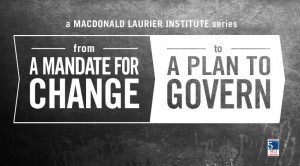
Authors’ analysis places C-51 in the context of Canada’s evolving response to terrorist threats, and offers recommendations to keep Canadians safe and our freedoms intact
OTTAWA, Feb. 18, 2016 – Canada’s new government should be applauded for moving quickly, since its election last October, to develop a plan for protecting Canadians from domestic terrorism. It has proposed a number of positive measures for improving the previous government’s anti-terrorism legislation, C-51.
Now the hard work – of balancing the tension between pre-emptive steps to prevent terrorism and the risk of sweeping emergency measures in response to successful attacks – begins.
 Macdonald-Laurier Institute Senior Fellows Sean Speer and Christian Leuprecht, in a new commentary, lay out a plan to help the government achieve its goal of “keeping Canadians safe”.
Macdonald-Laurier Institute Senior Fellows Sean Speer and Christian Leuprecht, in a new commentary, lay out a plan to help the government achieve its goal of “keeping Canadians safe”.
First on the list? The government needs to recognize that security and freedom aren’t tradeoffs, but that freedom depends on security.
“To posit freedom and security as a zero-sum dichotomy is a straw man of an argument”, write Speer and Leuprecht. “These are complementary principles – we cannot have one without the other”.
To read the full commentary, titled “Defending Freedoms By Effectively Countering Terrorism”, click here.
Stopping threats before they emerge
The threat to Canadians is changing.
Centrally commanded organizations such as al-Qaeda, bent on inflicting large-scale, mass casualty attacks, for years dominated the attention of security organizations.
The new model – reflected in the attacks orchestrated on Parliament Hill in October 2014 – is different. These so-called “lone wolf” terrorists are amateurs, decentralized, and inspired by jihadi ideas but not directly affiliated with foreign groups. Security agencies require the means to disrupt plots before they turn to violent action, something that, we should remember, will both protect the public and save the would-be terrorist from a disastrous decision as well.
 The authors note that the previous government’s Anti-Terrorism Act (Bill C-51) should be seen in the context of this evolving threat environment and as a continuation of a shift to preventing terrorist attacks, rather than prosecuting them after the fact, a shift that began with an earlier Liberal government’s Counter Terrorism Act.
The authors note that the previous government’s Anti-Terrorism Act (Bill C-51) should be seen in the context of this evolving threat environment and as a continuation of a shift to preventing terrorist attacks, rather than prosecuting them after the fact, a shift that began with an earlier Liberal government’s Counter Terrorism Act.
While C-51 is imperfect and reforms should be considered, Leuprecht and Speer recommend the new government retain certain measures – such as allowing government agents to inform Canadian parents their children are travelling abroad to join ISIS, something they couldn’t do previously – that assist in preventing those who conceive violent ideas from acting on them.
Protecting Canadians
Speer and Leuprecht offer several other recommendations for protecting Canadians:
- Recognize the threat: Too often the democratic way of life is taken for granted; it needs to be defended from the danger violent extremism poses.
- Strike a balance on oversight: No one disputes the need for accountability, but the devil is in the details. The challenge, say the authors, will be to avoid cosmetic changes that only placate the public while making prevention more difficult.
- Be cautious about removing the disruption powers in Bill C-51: Counter-terrorism policy, because its purpose is to prevent terrorist attacks rather than prosecute them after the fact, is different from other criminal investigations. CSIS should be allowed to continue detecting, deterring and ultimately disrupting violent action.

- Effective security must mean local engagement: Expecting the RCMP and CSIS to counter violent extremism in local communities is the equivalent of the federal government taking over garbage disposal. That’s why local and provincial police forces should be responsible for building the relationships with community leaders that tear terrorist activity out by the root.
- Don’t apologize for protecting Canadian values: There are core values that underpin our constitutional democracy and we should not be reluctant – due to relativism or other factors – to articulate and promote them.
This paper is the ninth entry in MLI’s series, From A Mandate For Change To A Plan To Govern.
The series, which is publishing weekly from the Throne Speech to the first budget this spring, is designed to offer practical policy recommendations that help the newly-elected government follow through on its election promises.
***
Christian Leuprecht is Associate Dean of the Faculty of Arts and Associate Professor in the Department of Political Science and Economics at the Royal Military College of Canada, and cross-appointed to the Department of Political Studies and the School of Policy Studies at Queen’s University. He is a Senior Fellow with the Macdonald-Laurier Institute.
Sean Speer is a Senior Fellow at the Macdonald-Laurier Institute. He previously served in different roles for the federal government including as senior economic adviser to the Prime Minister and director of policy to the Minister of Finance.
The Macdonald-Laurier Institute is the only non-partisan, independent national public policy think tank in Ottawa focusing on the full range of issues that fall under the jurisdiction of the federal government.
For more information, please contact Mark Brownlee, communications manager, at 613-482-8327 x105 or email at mark.brownlee@macdonaldlaurier.ca.






